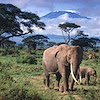
Dik-diks are monogamous.
Conflicts between Dik -diks sometimes occur over territory, males from each territory dash at each other, stop a while,
vigorously nod their heads and turn around. They will repeat this
process increasing the distance each time until one stops. Males mark
their territory with dung piles, and cover the female's dung with their
own. Due to predator who are their enemies it is dangerous for them to explore looking for new partners, therefore couples spend approximately 70% of their life time together. Females are sexually mature at 6 months and males at 12 months. The
female gestates for 169 to 174 days and bears a single offspring.































